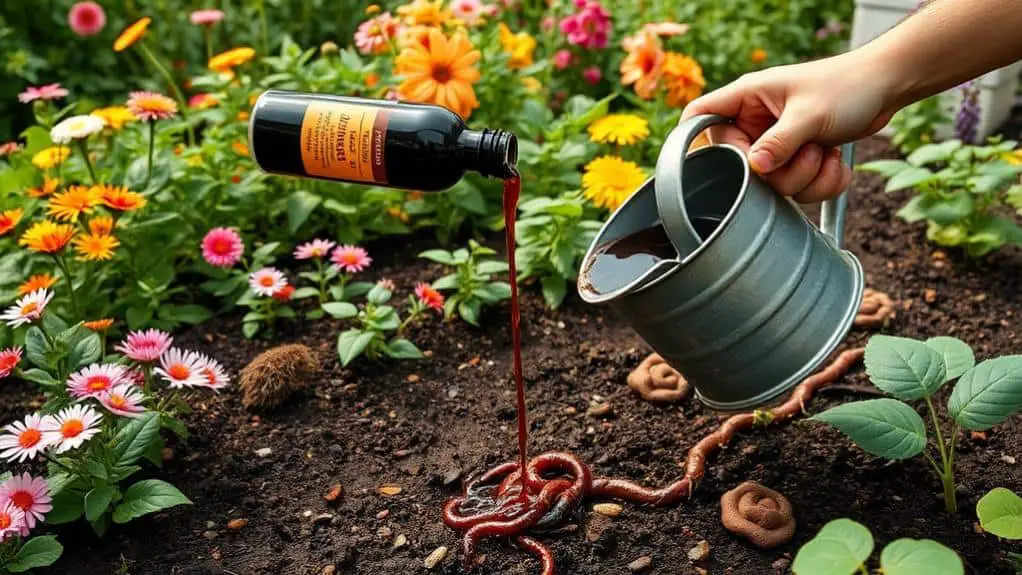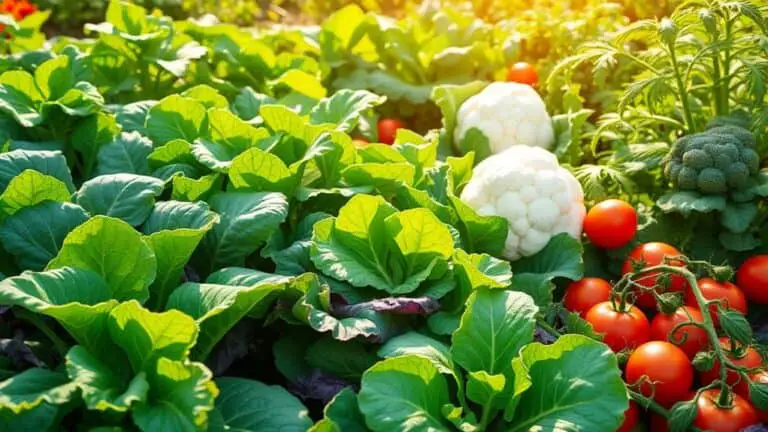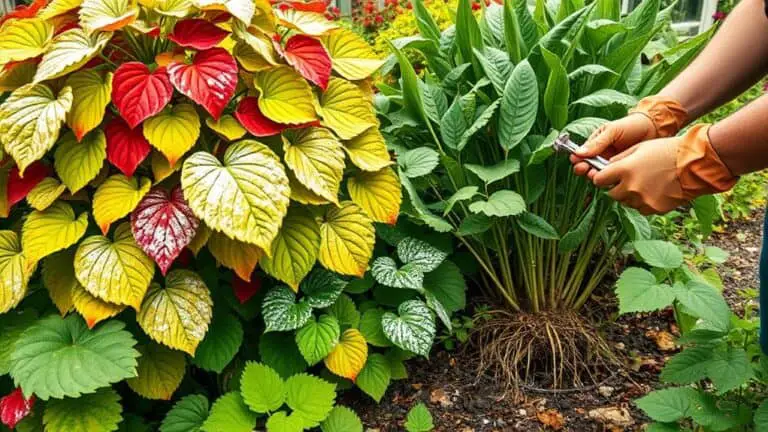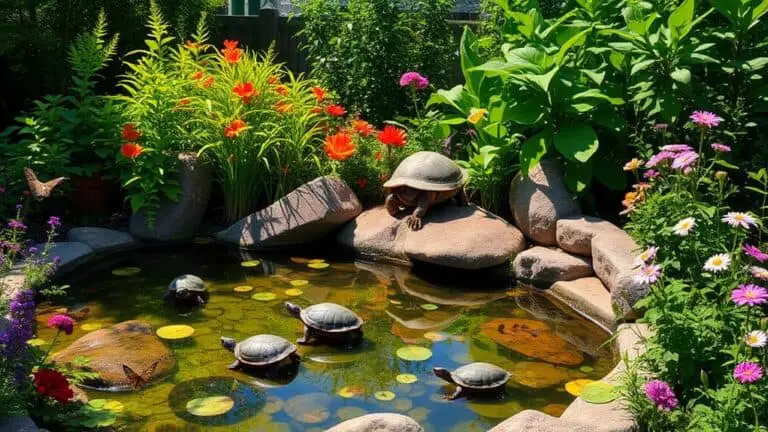10 Proven Benefits Of Adding Blackstrap Molasses To Your Garden
Imagine your garden as a bustling city where every element plays a crucial role in its success. When I first heard about using blackstrap molasses in the garden, I was intrigued by how something so simple could offer such multifaceted benefits. It’s not just about feeding your plants; it’s about enhancing soil health, boosting microbial activity, and even acting as a natural pest control. Curious how this humble pantry item can transform your garden into a thriving ecosystem? Let’s explore the advantages and application techniques that make this possible.
Nutritional Value of Blackstrap Molasses
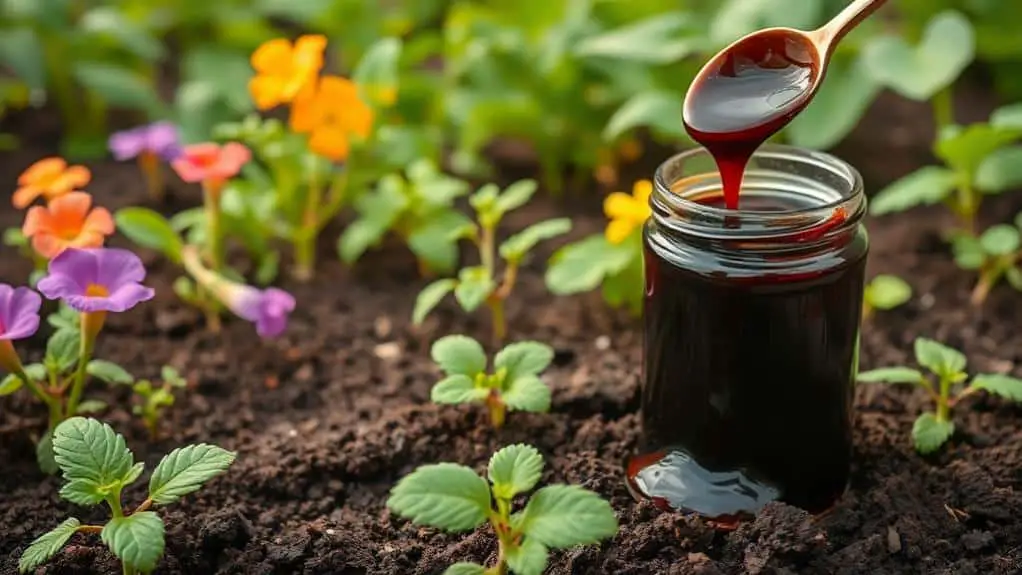
Blackstrap molasses isn’t just a pantry staple; it’s a powerhouse of essential nutrients that can transform your garden. Packed with calcium, magnesium, iron, potassium, and sulfur, blackstrap molasses is incredibly nutrient-dense.
These minerals are crucial for plant growth and overall health. When you use blackstrap molasses as an organic fertilizer, you’re not just feeding your plants; you’re also nourishing the beneficial microbes in the soil.
These microbes thrive on the complex sugars in molasses, creating a vibrant soil ecosystem. Plus, it’s a low-cost option that fits perfectly into sustainable gardening practices.
Regular applications can dramatically boost soil fertility and enhance the availability of micronutrients, leading to healthier, more robust plants in your garden.
Soil Health Improvement
While we’ve already seen the significant nutritional benefits of blackstrap molasses for plants, its impact on soil health is equally impressive.
Adding blackstrap molasses to your garden can transform your soil nutrient profiles, encouraging rich, fertile ground for your plants.
Here’s how it helps:
- Rich in essential minerals: Calcium, magnesium, iron, and potassium boost soil nutrient profiles.
- Microbial activity: The sugars in blackstrap molasses feed beneficial microbes, crucial for nutrient cycling.
- Improved soil structure: Regular use enhances soil texture and moisture retention.
- Organic pest control: Fostering a healthy ecosystem helps plants resist pests and diseases naturally.
- Enhanced decomposition: Stimulated microbial growth accelerates organic matter breakdown, improving nutrient availability.
These benefits make blackstrap molasses a fantastic addition to any garden!
Enhancing Microbial Activity
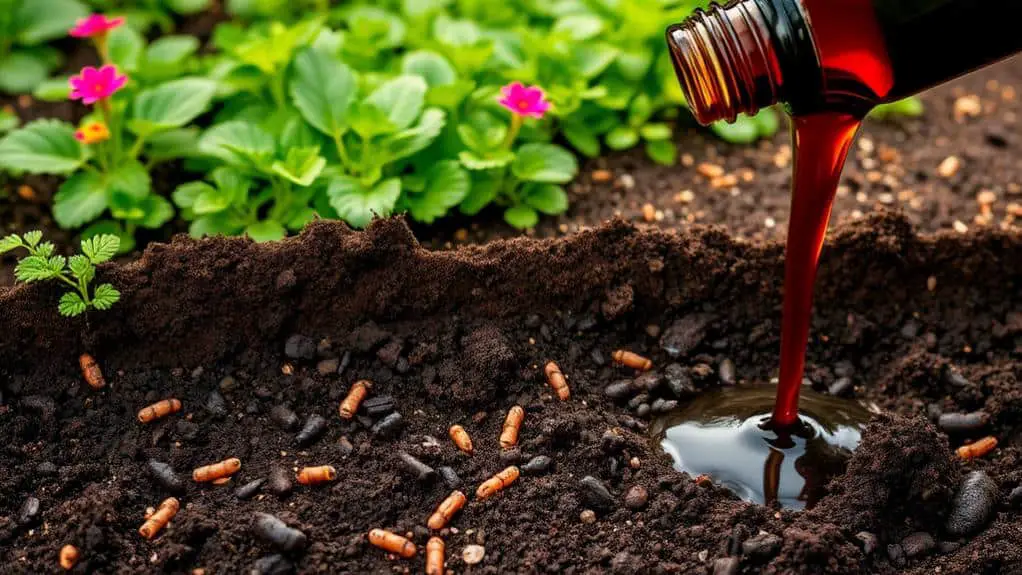
Adding blackstrap molasses to your garden can greatly boost microbial activity, which is essential for nutrient cycling and overall plant health.
The high sugar content in blackstrap molasses acts as a delicious food source for beneficial microbes. When these microbes thrive, they improve soil structure and moisture retention, creating a healthier environment for plants.
Regularly using blackstrap molasses encourages a diverse population of soil life, enhancing soil fertility and nutrient availability.
Studies show that boosted microbial activity accelerates the breakdown of organic matter, making nutrients more accessible to plant roots.
Natural Pest Control
Using blackstrap molasses in the garden is an excellent way to keep pests at bay naturally. Its rich sugar content messes with the feeding habits of pests like aphids and root knot nematodes, while its non-toxic nature guarantees that beneficial insects remain safe.
Deters Common Garden Pests
Blackstrap molasses serves as an effective natural pest deterrent in your garden by creating an environment that pests like aphids and root knot nematodes find unfavorable.
It not only helps in pest control but also attracts beneficial insects that prey on harmful pests. By using molasses, you’re opting for a chemical-free solution that keeps your plants safe and healthy.
Here are some benefits:
- Improved Pest Control: Keeps those pesky aphids and nematodes at bay.
- Attracts Beneficial Insects: Draws in helpful bugs that eat harmful pests.
- Chemical-Free: Safe for your garden and the environment.
- Healthier Plants: Promotes stronger plant growth.
- Fungal Reduction: Helps reduce harmful fungi when used as a foliar spray.
Give it a try and see your garden thrive!
Non-Toxic Pest Management
Gardening with blackstrap molasses not only deters common pests but also exemplifies a commitment to non-toxic pest management.
When I use molasses for plants, I’m embracing organic gardening practices that repel pests like aphids and root knot nematodes naturally, thanks to its high sugar content.
Plus, molasses disrupts harmful fungi, reducing diseases without chemicals. I love how it supports beneficial insects, creating a balanced ecosystem.
Applying a molasses solution every two weeks is simple and cost-effective. It boosts plant health, making them more resilient against pests and diseases.
This natural approach guarantees my garden thrives without harming the environment.
Enhances Plant Immunity
One of the remarkable benefits I’ve found in incorporating blackstrap molasses into my gardening routine is its ability to enhance plant immunity.
By using molasses, I’ve noticed my plants becoming more resilient against common pests. This natural pest control method is incredibly effective due to several reasons:
- Attracts beneficial insects: Helpful bugs that feed on pests are drawn to the garden.
- Strengthens cell walls: Nutrients in molasses like calcium and magnesium fortify plant cells.
- Boosts healthy microbes: Encourages beneficial microorganisms that outcompete harmful pests.
- Improves plant recovery: Plants bounce back faster from pest damage.
- Supports robust roots: Strong root systems enhance nutrient absorption and pest resistance.
Incorporating molasses is a game-changer for maintaining a healthy, thriving garden.
Application Techniques
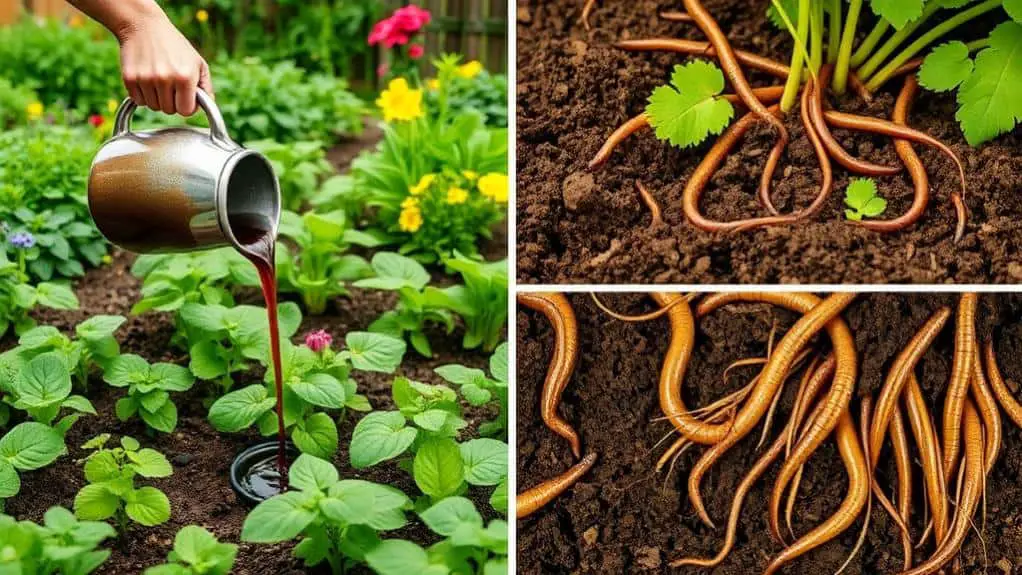
Applying blackstrap molasses in your garden can greatly enhance soil health and plant vigor. For the best results, try these application techniques.
Mix 1/2 cup of unsulfured blackstrap molasses per 1,000 square feet of garden space. This guarantees ideal nutrient absorption and boosts microbial activity.
To target individual plants, combine two tablespoons of molasses with one gallon of water. Dissolve the molasses in warm water before adding it to a sprayer. This prevents clogging and guarantees even distribution.
Apply every two weeks to maintain soil health, but don’t overdo it to avoid pH disruption.
You can also mix molasses with other organic fertilizers, like fish or probiotics, to enhance nutrient uptake and plant health.
Compatibility With Other Fertilizers
When it comes to mixing blackstrap molasses with other fertilizers, you’re in for a treat!
Combining it with fish emulsions or probiotics boosts nutrient absorption and promotes soil health, making your plants thrive.
For the best results, I recommend using 1 to 3 tablespoons of molasses per gallon of liquid fertilizer to create a nutrient-packed solution that your garden will love.
Enhances Nutrient Absorption
Blackstrap molasses’s unique properties make it an invaluable addition to your gardening toolkit, especially when it comes to enhancing nutrient absorption.
By mixing blackstrap molasses with other fertilizers, you can greatly boost microbial activity in your soil. The sugars in molasses provide energy for these beneficial microorganisms, enabling them to break down nutrients more efficiently. This process makes nutrients more accessible to your plants, promoting better growth and health.
- Mix with liquid fertilizers for enhanced nutrient availability.
- Improve leaf penetration when used with compost tea or liquid seaweed.
- Use 1 to 3 tablespoons per gallon for better nutrient cycling.
- Regular application promotes soil health and plant vigor.
- Supports microbial activity, which is essential for nutrient absorption.
Incorporating blackstrap molasses in your garden truly pays off!
Complements Organic Fertilizers
Taking your gardening to the next level, blackstrap molasses works wonders when paired with organic fertilizers. Mixing it with fertilizers like fish emulsion or kelp enhances their effectiveness, providing essential carbohydrates and trace minerals.
This combination boosts nutrient absorption and activates beneficial microbes in the soil, leading to healthier plant growth. Adding blackstrap molasses to compost or compost tea enriches the nutrient profile, aiding in the breakdown of organic matter.
For best results, use 1 to 3 tablespoons per gallon of fertilizer. This synergy fosters a robust soil ecosystem, helping plants thrive and resist pests and diseases.
Combining molasses with organic amendments truly creates a powerful, natural boost for your garden.
Storage and Shelf Life
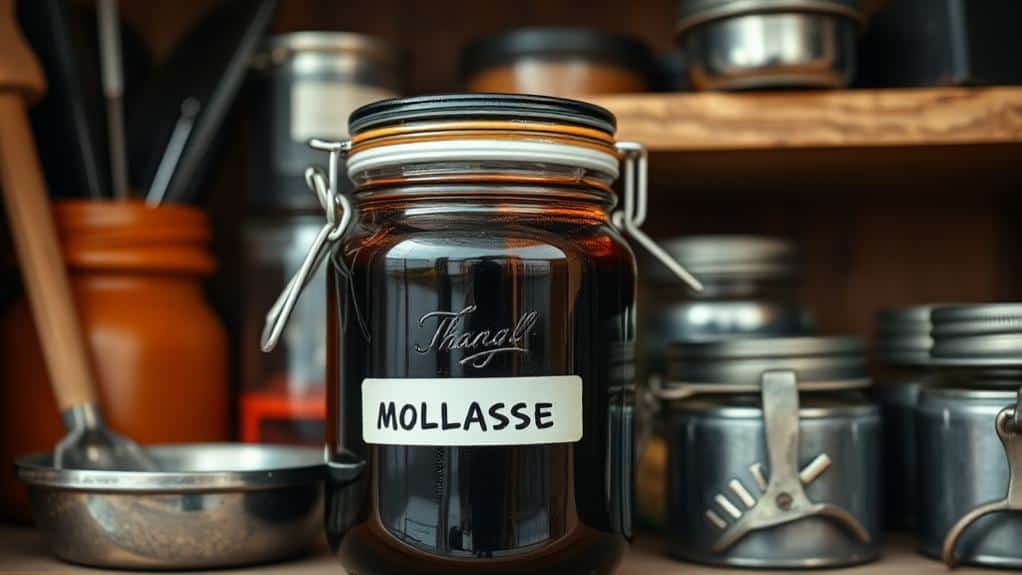
To keep blackstrap molasses effective in the garden, you’ve got to store it properly. Proper storage can greatly extend its shelf life and prevent spoilage. Here are some tips:
- Cool, Dark Place: Store molasses in a cool, dark area like a pantry to prevent it from spoiling.
- Airtight Containers: Use airtight containers to keep out moisture and air, which can cause mold.
- Regular Checks: Frequently check for signs of spoilage, like bad smells or visible mold.
- Moderation: Be cautious with the amount you use, as too much can promote unwanted yeast growth.
- Labeling: Clearly label your containers with the date of purchase to keep track of freshness.
Benefits for Livestock Feed
When it comes to enhancing livestock feed, few natural supplements are as beneficial as blackstrap molasses. This nutrient-rich syrup not only makes livestock feed more palatable, encouraging animals to eat more, but it also packs essential minerals like calcium, magnesium, iron, and potassium.
These minerals are crucial for the overall health and productivity of your livestock. The natural sugars in molasses provide a quick energy source, helping animals stay active and gain weight.
Plus, it improves digestion and nutrient absorption, leading to healthier animals overall. By adding blackstrap molasses to your livestock feed, you’re supporting their health in a cost-effective way, ensuring they get the nutrients they need without relying on expensive synthetic additives.
Cost-Effectiveness
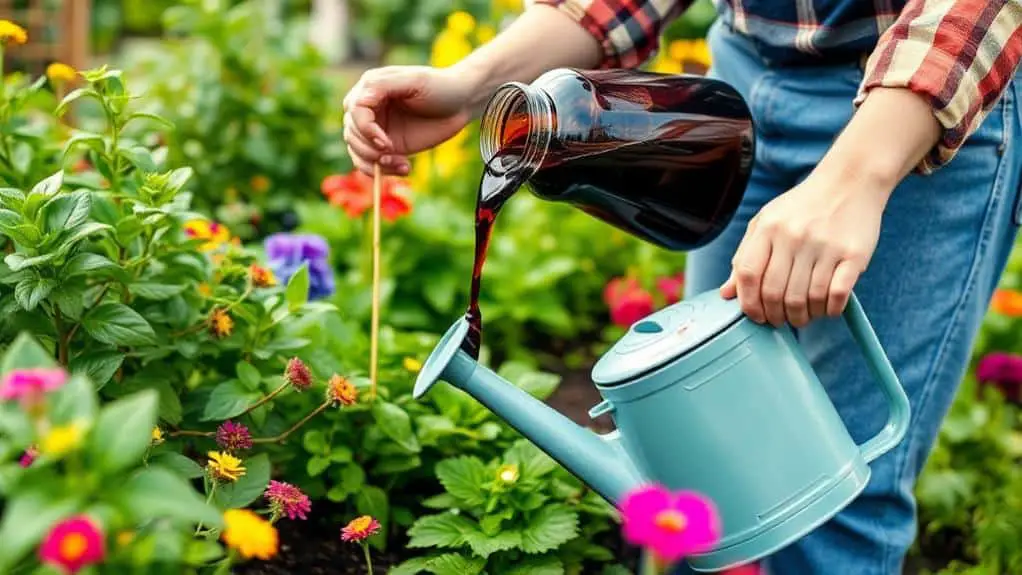
Blackstrap molasses stands out as a budget-friendly option for gardeners looking to enrich their soil without breaking the bank.
Its cost-effectiveness is impressive, especially when you consider the nutrient density it offers. Just a small amount can go a long way in improving soil health.
- Affordability: Blackstrap molasses costs less than synthetic fertilizers.
- Coverage: A single quart can cover a large garden area.
- Nutrient Density: Packed with calcium, magnesium, and iron.
- Reduced Chemical Dependency: Enhances soil health, reducing the need for chemical fertilizers.
- Microbial Boost: Improves microbial activity, leading to healthier plants.
Environmental Safety
Using blackstrap molasses in your garden is a fantastic way to keep things eco-friendly and safe for the environment.
It works as a non-toxic insect control, which means you won’t have to worry about harmful chemicals running off into the soil and water.
Plus, by supporting beneficial microbes, molasses helps maintain a balanced ecosystem, making your garden healthier and more sustainable.
Non-Toxic Insect Control
Opting for blackstrap molasses as a natural insect deterrent offers a safe and effective way to protect your garden from pests like aphids and root knot nematodes.
This non-toxic method guarantees that your plants are healthier and free from harmful chemicals, perfect for anyone practicing organic gardening.
Here’s why blackstrap molasses is a great choice:
- Non-toxic: Keeps your garden safe for kids and pets.
- Repels pests like aphids: Naturally keeps harmful insects at bay.
- Healthier plants: Promotes vibrant, robust growth.
- Fungal control: High sugar content deters harmful fungi.
- Eco-friendly: Supports sustainable and organic gardening practices.
Reduces Chemical Runoff
Reducing chemical runoff is essential for maintaining environmental safety in our gardens and local ecosystems. By using blackstrap molasses as a natural alternative to chemical fertilizers, we can greatly diminish the risk of harmful runoff into nearby waterways.
This practice not only promotes soil health but also avoids introducing synthetic chemicals that could contaminate our surroundings. Blackstrap molasses boosts microbial activity in the soil, which supports a natural nutrient cycling system and reduces our reliance on chemical inputs.
Additionally, molasses improves soil structure and moisture retention, cutting down on erosion and runoff during heavy rains. Adopting this method helps us align with sustainable agricultural practices and reduces the carbon footprint linked to chemical fertilizers.
Supports Ecological Balance
When it comes to supporting ecological balance, blackstrap molasses plays an essential role in maintaining environmental safety in our gardens.
By integrating blackstrap molasses into our gardening routine, we align with organic farming practices, which promotes a sustainable and healthy ecosystem. It’s free of harmful preservatives, ensuring the safety of beneficial microbial life and improving soil health.
Consider these benefits:
- Boosts microbial activity: Enhances soil health and plant resilience.
- Nutrient-rich: Provides essential minerals for a thriving ecosystem.
- Organic and safe: Fits well with organic farming practices.
- Reduces synthetic use: Minimizes chemical runoff and protects the environment.
- Supports natural balance: Fosters a healthy ecosystem to combat pests and diseases.
Using blackstrap molasses is a simple yet powerful way to nurture our gardens naturally.
Frequently Asked Questions
How to Use Blackstrap Molasses in the Garden?
To boost soil health and nutrient levels, I mix 1/2 cup of blackstrap molasses per 1,000 square feet. For pest control and enhancing the fermentation process, I dilute two tablespoons in warm water and apply every two weeks.
Which Plants Like Molasses?
Molasses marvels many plants! Tomatoes, peppers, and carrots thrive with an herb growth and nutrient boost. Leafy greens, root veggies, and fruit-bearing plants see soil health and pest control improvements. Even ornamentals show splendid results.
Does Molasses Really Help Plants Grow?
Yes, molasses really helps plants grow. I’ve seen improved soil health, enhanced nutrient absorption, and increased microbial activity in my garden. My plants show better resilience against pests and diseases, leading to healthier, more vigorous growth.
Is Molasses Good for Tomato Plants?
Yes, molasses is great for tomato plants! It boosts tomato nutrient levels, improves soil health, aids pest control, and supports fermentation benefits. I’ve seen healthier, more resilient tomatoes with regular molasses applications. Give it a try!
Conclusion
Imagine your garden as a thriving symphony, and blackstrap molasses is the conductor ensuring everything plays in harmony. By adding this natural wonder, you’re boosting soil health, enhancing microbial activity, and even keeping pests at bay—all without harmful chemicals. It’s like giving your plants a nutritious treat that also benefits the environment. So, why not give it a try? Your garden will thank you, and you’ll love the vibrant results!

